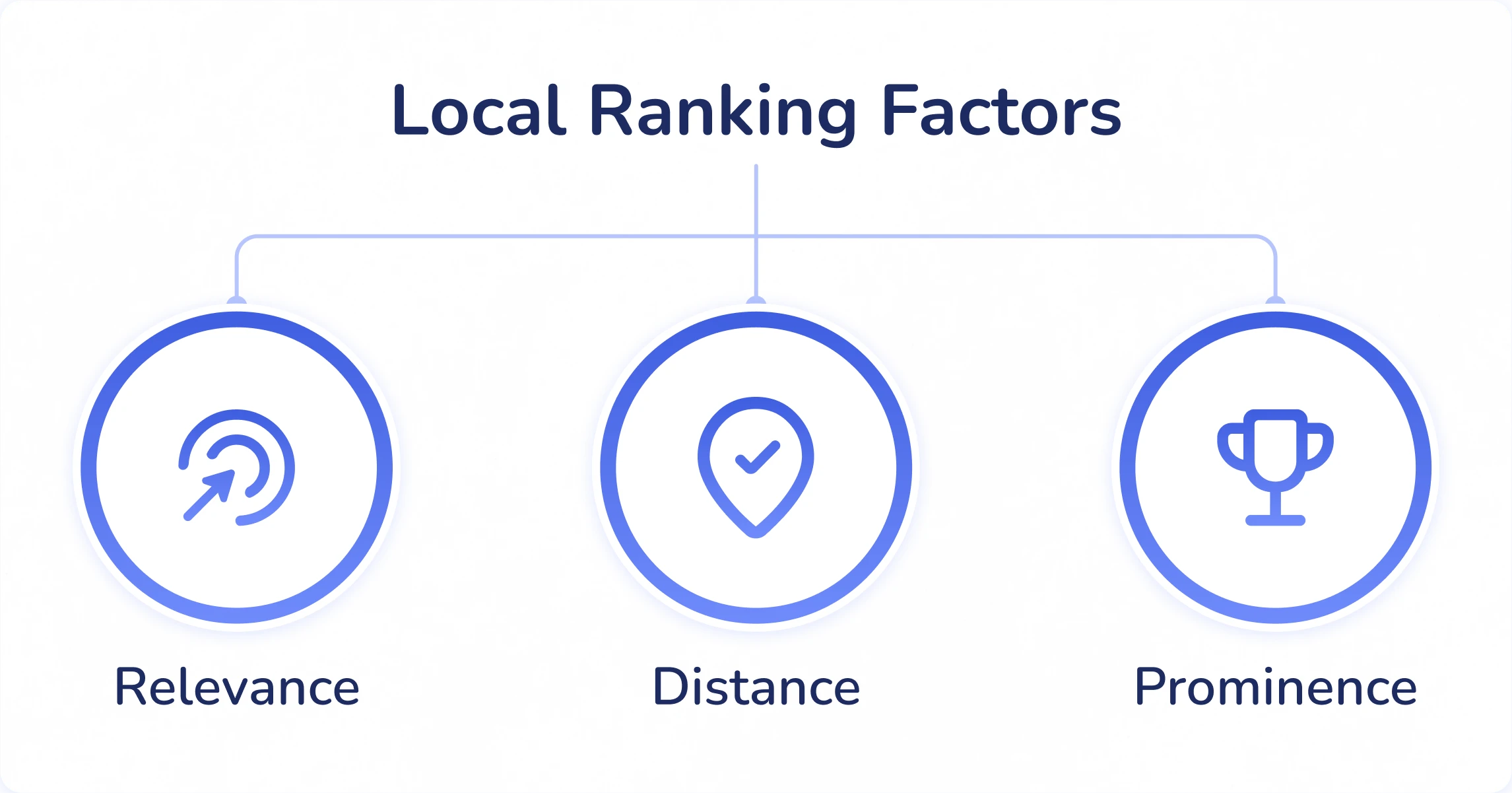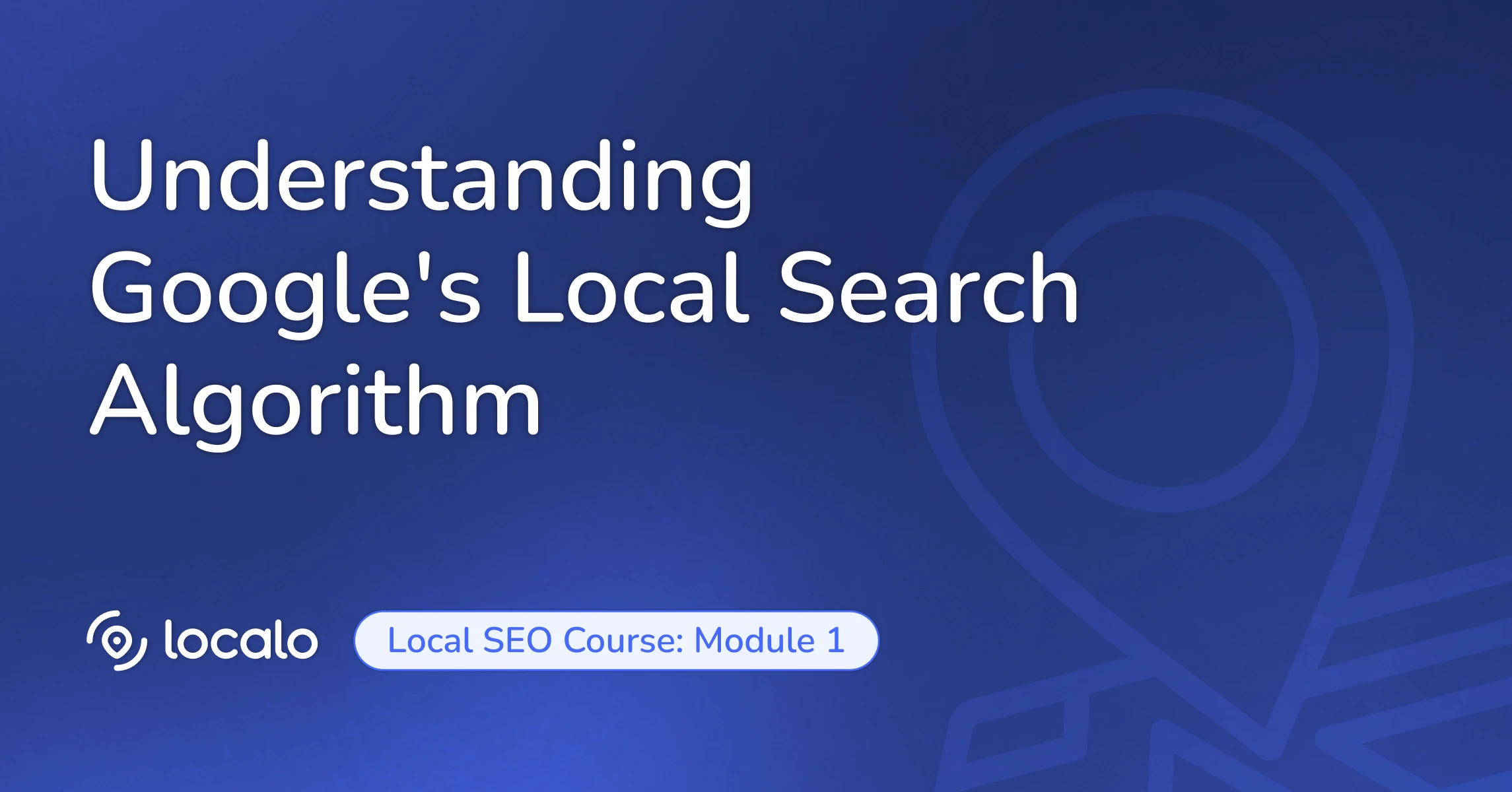How Search Engines Handle Local Queries
To master local SEO, you must first understand how search engines, particularly Google, handle local queries. Let me break this down into digestible parts:
The Local Search Algorithm
When someone performs a local search, Google’s algorithm considers three main factors:
- Relevance: How well does your business match what the searcher is looking for?
- Distance: How far is your location from the searcher? (or from the location specified in the search)
- Prominence: How well-known and reputable is your business?
Let me give you a practical example. If someone searches for “dentist in Chicago,” Google will:
- Look for dental practices in and around Chicago (Relevance)
- Consider the searcher’s location or the specified location to determine which practices are closest (Distance)
- Evaluate factors like reviews, citations, and online presence to determine which practices are most prominent (Prominence)

Welcome back to Localo’s Complete SEO Course! In our previous lesson, we introduced the concept of local SEO and its importance. Today, we’re diving into something equally fascinating: how Google’s local search algorithm actually works. We’ll uncover the mechanics behind the scenes, explore the three main ranking factors, and see how they impact your business visibility in real-world searches.
How does Google process local search queries?
When someone performs a local search, something remarkable happens in a fraction of a second. Google’s algorithm springs into action, analyzing millions of businesses to find the most relevant options for that specific searcher. But unlike regular search results, local search considers not just what you’re looking for, but where you are. Think of it like asking a knowledgeable local friend for recommendations. Just as your friend would consider what you want, how far you’re willing to travel, and which places have the best reputation, Google’s local algorithm weighs similar factors.
What are the three main ranking factors Google uses?
Google evaluates local businesses based on three primary factors: Relevance, Distance, and Prominence. Let’s break these down one by one.
How does Relevance impact your local rankings?
Relevance is all about how well your business matches what the searcher is looking for. Google wants to show people businesses that directly address their needs or questions. For example, if someone searches for “organic juice bar,” Google will prioritize businesses that explicitly offer organic juices over general smoothie shops. This is why being specific in your Google Business Profile and website content about exactly what you offer is so crucial. To improve your relevance, make sure your business descriptions, category selections, and content clearly communicate your products, services, and specialties. The more precisely you match what searchers are looking for, the better your chances of appearing in their results.
How does Distance factor into local search results?
Distance is exactly what it sounds like—how far your business is from the searcher or their specified location. Proximity matters tremendously in local search because Google understands that convenience is a major factor in people’s decision-making. An interesting aspect of the distance factor is that it’s relative to the search. In dense urban areas with many options, Google might show results within just a few blocks. In rural areas, the distance radius might expand significantly to show relevant businesses. This is why it’s so important to accurately list your address and service areas in your Google Business Profile. Google needs to know precisely where you’re located to match you with nearby searchers.
What makes a business Prominent in Google’s eyes?
Prominence is essentially your business’s reputation and visibility, both online and in the real world. Google considers numerous signals to determine prominence, including:
- The quantity and quality of reviews
- Citations across the web
- Links to your website
- Local press mentions
- Overall online presence
Well-established businesses often have a natural advantage in prominence. For example, famous museums, landmark hotels, or well-known brand stores may rank well because they’re recognized as prominent entities. But local businesses can build prominence through consistent online reputation management and local marketing efforts.
How do these factors work together in a real search?
Let’s walk through a practical example. Imagine someone in downtown Chicago searching for “dentist.” Here’s how these factors come into play:
First, Google identifies all the dental practices in and around Chicago—this is the relevance factor at work. It looks for businesses that clearly identify as dental practices in their Google Business Profile and website content.
Next, it considers the distance factor. The dentist offices closest to the searcher’s location in downtown Chicago receive priority, assuming all other factors are equal.
Finally, Google evaluates prominence. It looks at which dental practices have the strongest reputation signals—those with more positive reviews, consistent citations across the web, strong website authority, and active Google Business Profiles.
The results Google shows represent its best attempt to balance all three factors. A highly prominent dental practice that’s a bit farther away might still rank above a less-known practice that’s closer. Or a highly relevant specialized dental practice might outrank a general dentist with slightly better prominence.
What real-world impact do these factors have on your business visibility?
Understanding these three factors helps explain why search results can vary dramatically from person to person and location to location.
For instance, the same search for “coffee shop” will show completely different results if performed in different neighborhoods of the same city. Your business might appear prominently for searchers in your immediate vicinity but be invisible to those just a few miles away.
This is why it’s essential to optimize for all three factors rather than focusing on just one. A strong local SEO strategy addresses:
- Relevance through precise category selection and detailed business information
- Distance through accurate address and service area information
- Prominence through review management, citation building, and local content creation
Remember that these factors interact dynamically. As you improve your prominence through better reviews and more citations, Google may be willing to show your business to searchers who are a bit farther away. Similarly, if you improve your relevance by adding more specific service information, you might outrank competitors who are geographically closer to the searcher.
In our next lesson, we’ll explore one of the most visible aspects of local search: the Local Pack. We’ll uncover what makes this prime real estate so valuable and how you can optimize your business to appear in these coveted top positions.
Thank you for joining me today, and I’ll see you in the next video!
The websites and Google Business Profiles used throughout the course are for educational purposes only. We're not affiliated with these businesses and don't claim any endorsement from them. All trademarks belong to their owners. Some examples include visual changes (made with browser tools) to help illustrate the SEO concepts we're teaching. These edits are strictly local and illustrative of specific SEO concepts. They don't affect the original websites.




